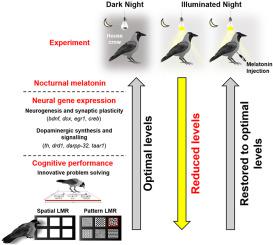Environmental Pollution ( IF 8.9 ) Pub Date : 2022-06-14 , DOI: 10.1016/j.envpol.2022.119618 Amaan Buniyaadi 1 , Abhilash Prabhat 1 , Sanjay Kumar Bhardwaj 2 , Vinod Kumar 1

|
This study investigated the role of nocturnal melatonin secretion in the cognitive performance of diurnal animals. An initial experiment measured the cognitive performance in Indian house crows treated for 11 days with 12 h light at 1.426 W/m2 (∼150 lux) coupled with 12 h of 0.058 W/m2 (∼6-lux) dim light at night (dLAN) or with absolute darkness (0 lux dark night, LD). dLAN treatment significantly decreased midnight melatonin levels and negatively impacted cognitive performance. Subsequently, the role of exogenous melatonin (50 μg; administered intraperitoneally half an hour before the night began) was assessed on the regulation of cognitive performance in two separate experimental cohorts of crows kept under dLAN; LD controls received vehicle. Exogenous melatonin restored its mid-night levels under dLAN at par with those under LD controls, and improved the cognitive performance, as measured in the innovative problem-solving, and spatial and pattern learning-memory efficiency tests in dLAN-treated crows. There were concurrent molecular changes in the cognition-associated brain areas, namely the hippocampus, nidopallium caudolaterale and midbrain. In particular, the expression levels of genes involved in neurogenesis and synaptic plasticity (bdnf, dcx, egr1, creb), and dopamine synthesis and signalling (th, drd1, drd2, darpp32, taar1) were restored to LD control levels in crows treated with illuminated nights and received melatonin. These results demonstrate that the maintenance of nocturnal melatonin levels is crucial for an optimal higher-order brain function in diurnal animals in the face of an environmental threat, such as light pollution.
中文翻译:

夜间褪黑激素水平影响昼夜动物的认知:来自暴露在照明夜间环境中的鸦科动物的分子见解
本研究调查了夜间褪黑激素分泌在昼夜动物认知表现中的作用。一项初步实验测量了印度家乌鸦在 1.426 W/m 2 (~150 勒克斯) 的 12 小时光照和 12 小时 0.058 W/m 2光照下处理 11 天的认知能力(~6-勒克斯)夜间昏暗(dLAN)或绝对黑暗(0勒克斯暗夜,LD)。dLAN 治疗显着降低了午夜褪黑激素水平并对认知能力产生负面影响。随后,评估了外源褪黑激素(50 μg;在夜间开始前半小时腹腔内给药)对两个单独的实验组乌鸦的认知能力调节的作用。LD 控制收到车辆。外源性褪黑激素在 dLAN 下恢复其午夜水平与 LD 控制下的水平相当,并改善了认知能力,如在 dLAN 治疗乌鸦的创新解决问题和空间和模式学习记忆效率测试中所测量的。与认知相关的大脑区域,即海马体,同时发生了分子变化,nidopallium caudolaterale 和中脑。特别是与神经发生和突触可塑性有关的基因的表达水平。bdnf、dcx、egr1、creb)和多巴胺合成和信号传导(th、drd1、drd2、darpp32、taar1)在经过光照处理并接受褪黑激素治疗的乌鸦中恢复到 LD 控制水平。这些结果表明,面对光污染等环境威胁,维持夜间褪黑激素水平对于昼夜动物的最佳高级脑功能至关重要。


























 京公网安备 11010802027423号
京公网安备 11010802027423号